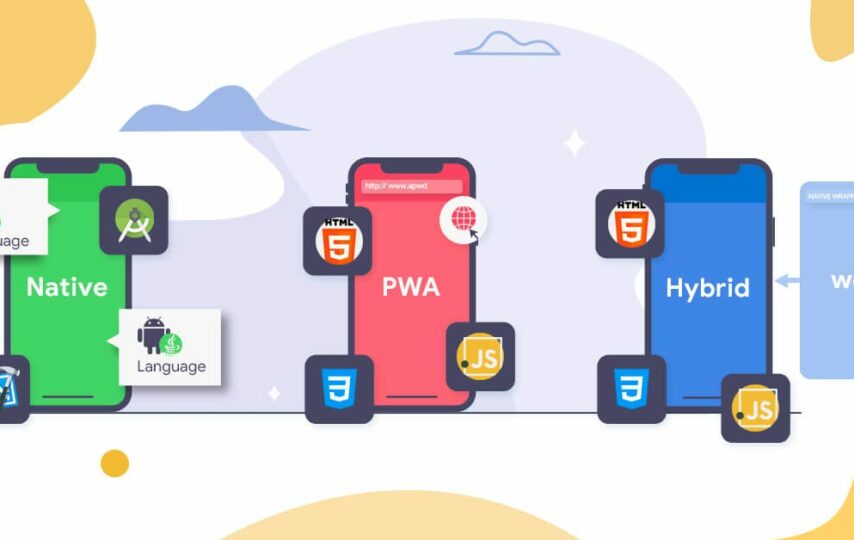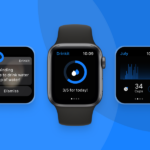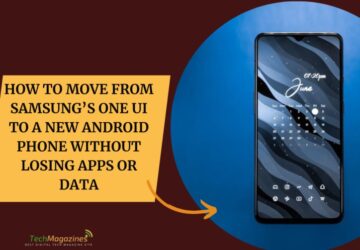The future of mobile apps is the future of online. For businesses to survive it is important to meet customers in the environment of their choice, not where it is convenient for them. As more and more people use smartphones, reaching out to them using a mobile app is the most effective strategy. However, every client has a question for themselves when it comes to designing an app: PWA Vs. Hybrid, which is ideal for me in building the mobile app of my choice?
In today’s advancing world, both technologies prove to give the best result. However, there is a variable difference between both methodologies. A detailed review of Hybrid App Development Company and Progressive Web App development, including the pros, cons, and other related aspects, helps clients make better decisions and build a responsive mobile app that suits their business.
PWA APP DEVELOPMENT: HARNESSING PLATFORM-SPECIFIC POWER
The term “progressive web app” (PWA) refers to an application that is created using web platform technologies but offers a user experience similar to that of a platform-specific application. A PWA, like a website, can operate across several platforms and gadgets using only one codebase. It functions similarly to platform-specific software, it can be installed on a device, used offline and in the background, and can be integrated with other installed apps and devices. Spotify, Starbucks, and MakeMyTrip are a few well-known PWA applications.
Pros of PWA:
- Cross-Platform Compatibility: PWAs are compatible with various operating systems and devices, enabling developers to reach a broader audience without the need for separate platform-specific development.
- Offline Functionality: PWAs can cache essential resources, allowing users to access the app’s core features even without an internet connection, ensuring uninterrupted usability.
- Lower Development Costs: As PWAs are web-based, they require only one codebase, reducing development efforts, and expenses compared to native apps.
- Easy Maintenance: Updating a PWA is seamless, as changes are instantly reflected across all platforms, eliminating the need for users to download updates manually.
- No Installation Required: PWAs, unlike traditional mobile applications, do not need to be downloaded from app stores. Users can access them directly through a URL, saving device storage and providing a seamless user onboarding experience.
- Low on Data: PWAs can utilize caching far better than regular web applications, they are substantially smaller than mobile apps and consume a lot less data. For example, Tinder’s PWA is only 2.8 MB in size, compared to its enormous 30 MB Android app.
- App Store Independent: PWAs are app stores independent, which is fantastic for smaller companies and independent app developers that don’t want to pay price to Apple or Google to get their app published.
Cons of PWA:
- Limited Access to Native Features: PWAs cannot access all device features and capabilities, leading to reduced functionality when compared to native apps.
- Performance Limitations: Despite advancements in web technologies, PWAs might still face performance issues on certain devices or older browsers.
- App Store Visibility Challenges: PWAs lack visibility in app stores, which can hinder app discovery and user acquisition.
When to use PWA:
- PWAs are ideal for content-focused applications like news websites, blogs, and informational platforms.
- They are well-suited for businesses targeting a wide range of devices and seeking a cost-effective approach.
- PWAs are beneficial when offline access to essential features is crucial for the application’s success.
- For projects requiring rapid prototyping and frequent updates, PWAs provide an agile approach to development.
HYBRID APPS: THE BLEND OF CROSS-PLATFORM CONVENIENCE
A hybrid app combines the functions of a web app, which can be accessed online using a browser, and a native app, which is designed for a particular platform, such as Android or iOS. It is created using well-known front-end development tools and languages including HTML5, JavaScript, and CSS to provide cross-platform capability. In other words, developers do not need to write unique code for Android and iOS. Uber, Twitter, and Microsoft Teams are a few well-known hybrid applications.
Pros of Hybrid Apps:
- Cross-platform Compatibility: Hybrid apps are developed using web technologies and can be easily deployed on both Android and iOS platforms, saving time and effort.
- Access to Native Features: Hybrid apps can leverage native device capabilities like cameras, GPS, and contacts, providing a richer user experience compared to PWAs.
- Offline Support: Like PWAs, hybrid apps can offer offline functionality to some extent, depending on the nature of the application and data caching.
- Simplified Maintenance: Managing a single codebase for multiple platforms makes maintenance more efficient and cost-effective.
- App Store Distribution: Hybrid apps can be submitted to app stores like native apps, increasing discoverability and user trust.
- Simple to Update: An app update is essential for both developers and users to get the maximum performance out of the application. Updates take time and sometimes cause problems. Hybrid apps provide simple updates, improving user happiness.
- Superior UX/UI: Hybrid mobile development combines the benefits of native as well as web apps. Hybrid apps adjust to different device screens for quick data presentation and seamless data streaming. The excellent UI experience even increases the likelihood that the software will be accepted at the app store.
Cons of Hybrid Apps:
- Performance Concerns: Hybrid apps often suffer from performance issues due to the reliance on a web view to render content, leading to slower response times.
- User Experience: While hybrid apps strive to deliver native-like experiences, they might not match the smoothness and responsiveness of fully native apps.
- Longer load Times: Hybrid apps might take longer to load compared to other apps, potentially leading to a higher bounce rate among users.
When to use Hybrid Apps:
- Hybrid apps are well-suited for applications with moderate complexity, such as e-commerce platforms and social networking apps.
- They are beneficial for businesses seeking faster development timelines while targeting both Android and iOS users.
- Hybrid apps work well for projects with limited budgets, as they offer cost-effective development and maintenance.
- when an early-stage business has to quickly develop an MVP (Minimum Viable Product).
- When an Internet information download is required by the application.
- For enterprise applications that focus on internal processes and require device features’ access, hybrid apps can be a practical choice.
PWA VS HYBRID APP– THE PERFECT CHOICE
As you can see, every approach is different and offers different possibilities. But every project also has its requirements, thus the choice between a hybrid and a progressive web app will always be based on the potential and needs of the project. The best thing Enterprises can do is hire a skilled app development firm that can guide and help build a desired mobile application. One such company which is helping clients by providing comprehensive mobile app development services in India is OrangeMantra.
As a premier PWA and Hybrid mobile app development company in India, OrangeMantra offers customized mobile app development solutions that help businesses to grow digitally.
Why choose OrangeMantra?
- Strategic Consulting
- Proven Methodologies
- Adherence to Timelines
- Competitive Pricing
- Excellence in Coding
- Client-Centric Approach
Wrapping Things Up……..
There is no definitive right or wrong choice when determining what sort of app to develop. PWAs and hybrid apps each have advantages and disadvantages. Whether you choose a hybrid approach or a PWA, be sure that it supports both your business goals and user expectations.








